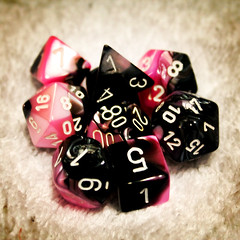 Chaotic Evil and Lawful Good come to mind.
Chaotic Evil and Lawful Good come to mind.No matter what I do, I can't seem to stick to them. Inevitably, if I roll them, I end up with an alignment change for lack of attention to the restrictions of my alignment. In turn, I suck at playing Paladins and any character who's too self-interested. Particularly those who are violently self-interested, or, violently reckless.
On the other hand, my best alignments are Neutral Good and. . . erm, Neutral Good. I'm pretty steady like that. Probably because I tend to be Neutral Good in my real life. I adhere to the laws, but am not overly concerned by them.
My husband, though, is a master at playing to his alignment. He's also really the only gamer I've played with who is, with one possible exception. Most of them tend to be more like me, with alignments that work for them and those that they can't manage. Or, as one player we used to play with, had alignment bipolar disorder and was changing alignments like the wind. That guy's wizard never made it past level 12 because he couldn't hold steady to one alignment. That dude was also the master of friendly fire, but he's really a story for another time.
But I wonder, do players really pay attention to alignment when they're in the brunt of the game? You know, when they're hacking and slashing, solving puzzles, or seducing the blacksmith's wife. Are they really thinking, "Hmm, I'm chaotic evil, so I think I'll just kill the blacksmith and take his wife as my concubine, because that's what chaotic evil would do"? Or, as a character progresses does their alignment become embedded as a part of who they are? Or is it just one inconsequential element of character write-up to be ignored at our earliest convenience?
I like to think that alignment is one element that helps us define who our characters are. When you've been playing for 14+ years and have hundreds of characters (not an exaggeration) for a dozen different systems, systems with alignment can help players for a basis for their character's personality and motivations. Because let's be real for a just a sec, how many unique character personalities can one person really devise before they're recycling a little bit? So, alignment becomes important to being the most interesting character possible.
Particularly when the characters in the group have alignments that challenge them to work together. It can create an interesting dynamic and shouldn't be forgotten. How does a Chaotic Evil vampire priest of love and war get alone with a Lawful Good paladin of "the one god"? Not easily, but as one game my husband was in a long time ago in a land far, far away can attest, it's possible, but not without some strife.
Alignment is important and playing to a character's alignment can make a character better than they might have otherwise been. Think about it.




